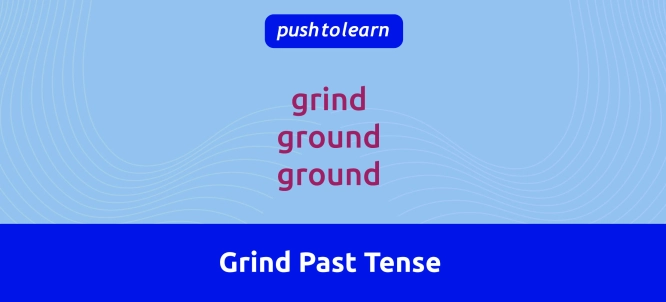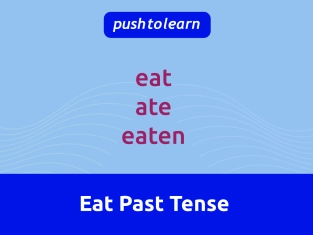by PushtoLearn
Pasado del verbo Grind en inglés
Tabla de contenidos
Grind – Formas en Pasado – Ejercicios
Estos ejercicios practican diferentes formas del verbo GRIND y otros VERBOS IRREGULARES.
Significado de Grind
El verbo "grind" significa romper algo en partículas más pequeñas, generalmente al triturar, frotar o cortar. También puede referirse a trabajar duro de forma constante y persistente.
Ejemplo:
-
"I grind coffee beans every morning for a fresh cup of coffee."
-
"She grinds her teeth when she’s stressed."
Cuando se habla de acciones pasadas, "grind" cambia a "ground".

Formas de "Grind"
|
Tiempo verbal |
Forma |
Oración de ejemplo |
|
Presente |
grind |
"They grind spices to add flavor to their dishes." |
|
Pasado |
ground |
"Yesterday, he ground some wheat to make flour." |
|
Participio pasado |
ground |
"She has ground the coffee beans to perfection." |
|
Participio presente |
grinding |
"The workers are grinding metal to shape it." |
Ejemplos de "Grind" en oraciones
Pasado simple (ground):
-
"The chef ground fresh pepper onto the dish before serving."
-
"She ground her teeth during the meeting because of anxiety."
-
"I ground the herbs into a fine powder for the recipe."
Participio pasado (ground):
-
"He has ground the spices to a fine consistency."
-
"They had ground the wheat before the mill broke."
-
"The artist has ground pigments to create vibrant colors."
Errores Comunes con "Grind"
1. Usar "grinded" en lugar de "ground":
Un error común es formar el pasado o participio pasado como "grinded", lo cual es incorrecto. La forma correcta siempre es "ground".
-
Incorrecto: "She grinded the coffee beans this morning."
-
Correcto: "She ground the coffee beans this morning."
-
Incorrecto: "The machine has grinded the metal parts."
-
Correcto: "The machine has ground the metal parts."
2. Olvidar el significado figurado de "grind":
"Grind" también puede usarse de manera figurada para referirse a trabajar duro o perseverar en una tarea difícil. Este uso puede no ser reconocido por los estudiantes.
-
Correcto: "He ground through hours of studying for the exam."
-
Correcto: "They ground out a victory in the final minutes of the game."
3. Confundir "ground" con "grinding" en acciones en curso:
Los estudiantes a veces usan incorrectamente "ground" en lugar de "grinding" para describir acciones que están ocurriendo.
-
Incorrecto: "I am ground the spices for the curry."
-
Correcto: "I am grinding the spices for the curry."
4. Usar "grind" en lugar de "crush" o "blend" en ciertos contextos:
"Grind" se usa comúnmente para convertir algo en polvo o partículas finas, pero a veces los estudiantes lo emplean cuando "crush" (aplastar) o "blend" (licuar) serían más precisos.
-
Incorrecto: "I grind the garlic for the sauce."
-
Correcto: "I crush the garlic for the sauce."
-
Incorrecto: "She ground the fruits to make juice."
-
Correcto: "She blended the fruits to make juice."
Los verbos irregulares son fundamentales para aprender el Pasado Simple. Realiza ejercicios adicionales de Gramática A1.
FAQ
¿Cuál es el pasado del verbo "grind"?
El pasado del verbo "grind" es "ground".
¿Cómo uso "ground" en una oración?
Usa "ground" para describir acciones de moler o triturar que ocurrieron en el pasado.
Ejemplo: "I ground some coffee beans for breakfast."
¿Cuál es el participio pasado de "grind"?
El participio pasado de "grind" también es "ground".
Ejemplo: "She has ground the spices to a fine powder."
¿"Grinded" es correcto?
No, "grinded" no es correcto. Siempre usa "ground" para el pasado simple y el participio pasado.
¿Puede usarse "grind" de forma figurada?
¡Sí!
Ejemplo: "He ground through the difficult task," lo que significa que trabajó duro para completarla.

